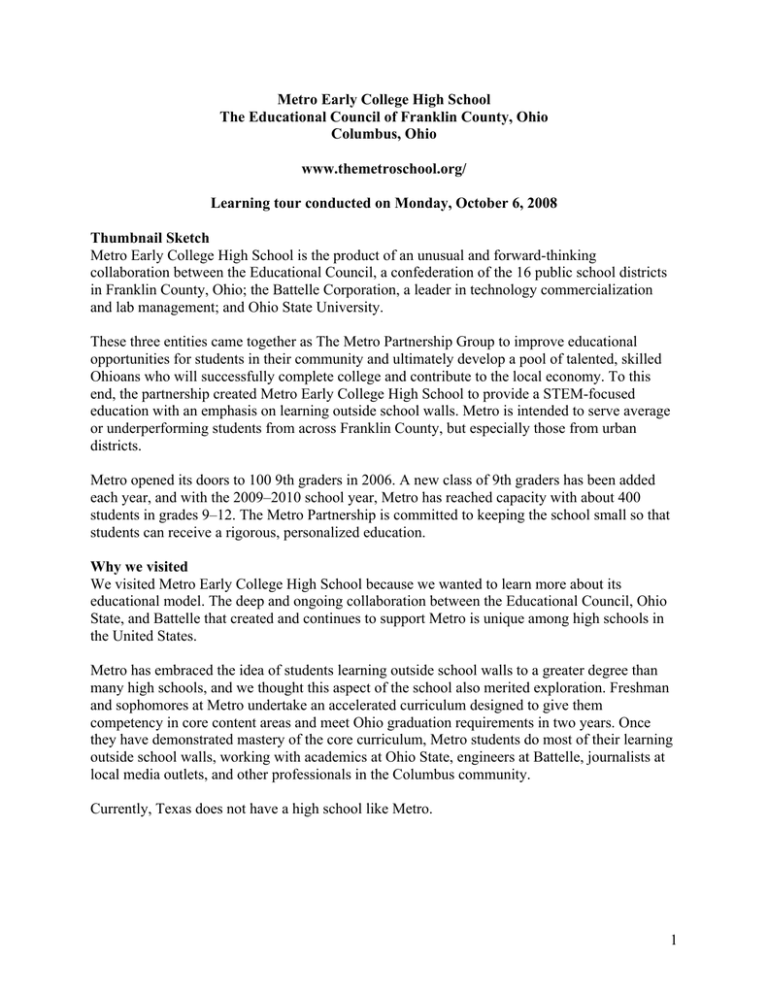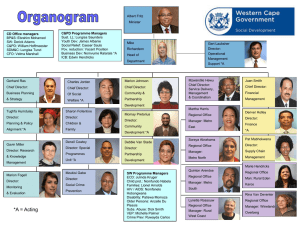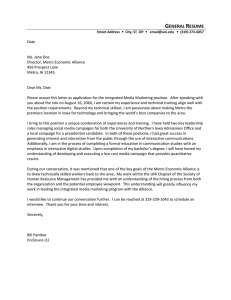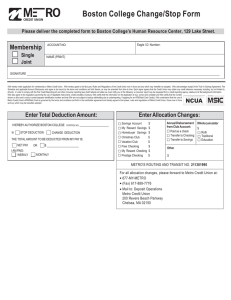Metro Early College High School Columbus, Ohio
advertisement

Metro Early College High School The Educational Council of Franklin County, Ohio Columbus, Ohio www.themetroschool.org/ Learning tour conducted on Monday, October 6, 2008 Thumbnail Sketch Metro Early College High School is the product of an unusual and forward-thinking collaboration between the Educational Council, a confederation of the 16 public school districts in Franklin County, Ohio; the Battelle Corporation, a leader in technology commercialization and lab management; and Ohio State University. These three entities came together as The Metro Partnership Group to improve educational opportunities for students in their community and ultimately develop a pool of talented, skilled Ohioans who will successfully complete college and contribute to the local economy. To this end, the partnership created Metro Early College High School to provide a STEM-focused education with an emphasis on learning outside school walls. Metro is intended to serve average or underperforming students from across Franklin County, but especially those from urban districts. Metro opened its doors to 100 9th graders in 2006. A new class of 9th graders has been added each year, and with the 2009–2010 school year, Metro has reached capacity with about 400 students in grades 9–12. The Metro Partnership is committed to keeping the school small so that students can receive a rigorous, personalized education. Why we visited We visited Metro Early College High School because we wanted to learn more about its educational model. The deep and ongoing collaboration between the Educational Council, Ohio State, and Battelle that created and continues to support Metro is unique among high schools in the United States. Metro has embraced the idea of students learning outside school walls to a greater degree than many high schools, and we thought this aspect of the school also merited exploration. Freshman and sophomores at Metro undertake an accelerated curriculum designed to give them competency in core content areas and meet Ohio graduation requirements in two years. Once they have demonstrated mastery of the core curriculum, Metro students do most of their learning outside school walls, working with academics at Ohio State, engineers at Battelle, journalists at local media outlets, and other professionals in the Columbus community. Currently, Texas does not have a high school like Metro. 1 What we learned Metro’s governance and operation more closely resemble those of a nonprofit organization than a traditional high school. The school is operated by the Educational Council, and the Council’s Foundation manages the school’s finances. The Metro Partnership Group, made up of three representatives each from Ohio State University and the Educational Council and one each from the Battelle Corporation and Linden McKinley High School (another STEM school in Franklin County), serves as an advisory board. Students who attend Metro are concurrently enrolled in their home school district, and a personalized education plan is developed for each Metro student to ensure that they meet all graduation requirements at their home school. In addition, Metro students can participate in extracurricular activities at their home school. The Partnership Group is deeply involved in all aspects of the school, including assisting faculty and staff in developing the educational program, research and evaluation, professional development, funding, and community relations. The Partnership Group also plays a key role in helping Metro juniors and seniors find internships and community service opportunities. The Battelle Corporation’s commitment to facilitating the education of Metro students outside the school walls is so deep that Battelle has assigned a full-time staff member, Diana Wolterman, to work at Metro. Ms. Wolterman’s title is project manager in residence. She described her work as translating between the school and the engineers at Battelle. As an engineer, Ms. Wolterman helps Metro’s staff and faculty understand the world of engineering at Battelle and develop curriculum that translates that world for students so that they can have successful internships at Battelle. As part of the Metro staff, Ms. Wolterman helps students find the best possible fit for their internships at Battelle and advocates for them once they’re placed in an internship. Ms. Wolterman clearly enjoys having a foot in both of these worlds: “I have the best job in the world,” she said. “I am an engineer by training and I get to work with the most talented and committed group of teachers at Metro and the most talented and committed group of engineers at Battelle with the most energetic, curious, and talented group of students. It’s a dream job!” Culture: Like many of the STEM schools we have visited, Metro emphasizes empowering students to take responsibility for their education. This emphasis was evident during our tour, which was directed primarily by students. When we entered classrooms, a student greeted us and invited us to observe the learning. In the labs, we were invited to look at specimens on slides and observe experiments being conducted. In another classroom, we watched students engaged in a debate. In all the classes we visited, students seemed excited about what they were learning and doing and were so absorbed that they hardly noticed the visitors. Classrooms were vibrant with conversation, debate, and questions. One of the tour members exclaimed, “I love it here; it makes me want to come back to school!” The environment at Metro is open and trusting. Students are not prohibited from gathering in certain places; instead, students are encouraged to view the school as their own, and 2 learning can take place in the hallways, the library, lunch areas, in front of the administrative offices, and so on. During the tour, we noticed that there were no lockers in the hallways. One of our student guides explained, “This is an honor system. We trust each other and we know that no one will take anything that does not belong to them.” The students have cubbies to store their books and materials, but for the most part, students leave everything out in the open, and this system works well. One administrator noted that “This is not wonderland. We do have some issues with students losing things, but for the most part students do respect each other and their belongings.” Guiding the academic and social experience at Metro are the Metro Habits of Heart and Mind. Teachers and students we spoke with during the tour quoted these habits as easily as students at traditional high schools might quote their school song. All members of the Metro community agree to improve their practice of the habits, which include becoming an effective communicator and inquiring learner, an active and responsible decision maker, an effective collaborator, a critical thinker, and an engaged learner. Academics: Metro’s mission is “turning college aspirations into reality through personal relevance, academic rigor and transformative relationships.” Metro is guided in achieving its mission by the ten common principles of the Coalition of Essential Schools (www.essentialschools.org/pub/ ces_docs/about/phil/10cps/10cps.html) an organization that has created a network of schools that offer personalized learning, equity, and intellectual challenge for all students. Metro has adopted a two-phase approach to instruction. The first phase concentrates on developing students’ math and reading literacy. The second phase moves beyond the school walls to involve students in real-world investigations in social, life, and environmental sciences. STEM: Metro incorporates STEM throughout its curriculum. The math and science curricula are integrated to help students develop an understanding of math as the language of science. The courses of study students undertake emphasize knowledge of mathematical and scientific processes, application of scientific principles, understanding of design processes, and innovation. According to the school’s web site, “students must demonstrate their ability to communicate numerically, graphically, algebraically, verbally, and in writing their understanding and evaluation of empirical evidence in all that they do.” During students’ first two years at Metro—the first phase of instruction, known as “Core Prep”—the learning experience focuses on building students’ knowledge, skills, and competency in the core content areas of mathematics, science, social studies, and language arts. Metro High School operates on a trimester system that allows students to accelerate mastery in core content areas so that they have met most Ohio state diploma requirements by the end of their sophomore year. 3 To exit the preparatory phase, the students must demonstrate performances in these areas. Performance demonstrations include successfully passing the Ohio Graduation Tests and completing tasks that demonstrate that the student is able to explore solutions to real-world problems both independently and as part of a group. Students develop the skills they need to master the Core Prep curriculum through hands-on learning experiences that integrate all content areas. One example of this project-based approach to learning is the Butterfly Project, which involved a study of butterflies from the larval stage to maturation. Students were charged with designing the project in its entirety, from identifying vendors to buy butterfly larvae from to creating a nursery for the larvae, nurturing the butterflies to maturation, releasing them at local conservatory, and collecting, analyzing, and presenting data about the stages of butterfly growth and the overall success of the project. The Butterfly Project not only gave students the opportunity to apply mathematics and science to a real research project, but also developed their decision-making and collaboration skills. Further, the students’ results were not shelved away to gather dust, but were used by the local conservatory to inform its own butterfly project. As one teacher commented, “It’s not enough for us to just set up an assignment and expect the students to do it. We have to give students opportunities to become actively engaged in their own learning and then have students experience their contribution to something much larger than something that goes on in school.” Although freshman and sophomores spend their time inside the school building, the outside world frequently contributes to what they’re learning. Engineers from Battelle often participate in classes to support teaching and learning experiences for students. In addition, many graduate students from Ohio State coteach classes at Metro. Battelle staff and the graduate students also participate in judging student presentations, senior projects, and other student-centered activities. One of the student guides said, “When we have someone here from Battelle, we have to really know our stuff. They ask really hard questions about our projects, but we are always ready—that’s one thing our teachers do, they help us get prepared to present our topics, and we are the experts.” Once students have demonstrated mastery of the core curriculum, they embark on the second phase of instruction, College Access. This phase focuses on learning that takes place outside the school walls. The Metro Partnership Group has set up a number of “learning laboratories” in the central Ohio area; most of these laboratories are the result of the collaboration with Batelle and Ohio State University, which provide most of the research opportunities and outside internships for Metro students. Students in the College Access program choose a math– science focus or a humanities focus, and identify their particular areas of interest within these categories. The school then makes every effort to place students in a learning laboratory that corresponds with their interests. Learning laboratories usually involve an 4 internship of some sort—for example, working with an engineer at Battelle, a biologist at Ohio State, a journalist at a local paper—and corresponding coursework at The Ohio State University or Columbus State Community College. Metro students are expected to graduate high school with 45–90 quarter credits of college work; additionally they must complete 70 hours of community service. A Metro education is rigorous—as one student said, “It keeps me very busy but I love it.” Learning at Metro is not limited to the students; teachers are also given opportunities to experience externships with Batelle during the summer as well as the school year. These externships give teachers insight into what students experience during their internships and also help teachers connect their curricula to the application of science, mathematics, and other content that takes place in commercial and research institutions. Technology: Each Metro High School student is provided with a laptop computer upon matriculation. Students and their families are charged a maintenance fee for these computers, which are leased, but the fee is waived for students who qualify for the free- or reduced-price lunch program. Connectivity is key to learning at Metro High School; most instruction and assessment activities are delivered through the technology, so computers are crucial. As one student put it, “My computer is like one of my arms.” Students submit assignments electronically, and a portfolio of each student’s work is stored online; the student and his or her parents, teachers, and other Metro staff have access to the portfolio. Formative assessments of a student’s progress are tracked through the technology so that every student knows exactly where her or she excels and where he or she needs support. Teachers and students also make extensive use of Google Docs, which allows the creation of just-in-time and real-time communication networks around assignments and reflections. Each teacher uses Google Docs to create Task Stream, which is similar to Blackboard. This technology allows teachers and students to communicate about homework, grades, questions, and problems at any time during the school day or after hours. Students also use the technology to talk with each other and participate in online support groups. The ease of communication that the technology provides creates an environment of learning that students become responsible for and value. Who is Metro Early College High School? Students: Metro was created to serve average or underperforming students looking to be challenged and to improve themselves in a different environment; the Metro Partnership is particularly interested in attracting students from urban districts. Thus 68% of Metro’s students are from urban districts. Forty-one percent are eligible for the free- or reduced-price lunch program, and 38% are students of color. The number of boys and girls is nearly even. Teachers: 5 More than three quarters of Metro’s teachers hold master’s degrees, and several have PhDs. 6





